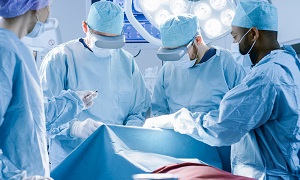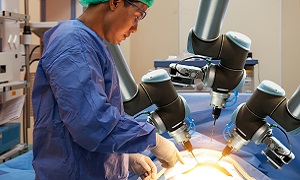Lobectomy
The surgical removal of the lobe of an organ is termed as lobectomy. Although it usually refers to the removal of a part of the lungs, it can also refer to the brain, liver, thyroid gland, etc.
Every organ in the human body is made up of several sections that are able to perform various different tasks. In case of your lungs, these sections are known as lobes. The right lung consists of three lobes; the upper, middle, and lower lobes. The left lung has only two lobes; the upper lobe and the lower lobe.
In the majority of cases, lobectomy is performed to remove a cancerous portion of the lung or sometimes another organ as well as to prevent cancer from spreading any further. Though this can’t always entirely get rid of the disease, it can help one to eliminate the primary source of it.
Purpose
Lobectomy is usually the main treatment for people having early stages of lung cancer when there is a tumor in just one part of the lung. In such a case, a lobectomy can be the best chance of cure, and might also be the only required treatment. However, if cancer has spread to other parts of the lung or the body, then this treatment is unable to help.
The surgery can also be helpful for people who are having other diseases in one part of their lungs, like:
- Tuberculosis
- Fungal infections
- Emphysema
- Noncancerous tumors
- Pus that fills one area, called an abscess
After the damaged lobe is removed, other parts of your lungs are able to expand, which can make it easier to breathe.
Preparation
Before the surgery, it is important that you fast for a minimum of eight hours. This can usually mean not eating or drinking after midnight. People who smoke regularly also need to quit smoking for some time before the surgery, as this improves the chances of a successful recovery.
Before the surgery, most people usually receive a sedative to help them relax. You might receive antibiotics as well and any other preparatory measures recommended by your doctor.
Procedure
Lobectomy is performed while you are under general anesthesia. Depending on your condition, your doctor can choose to do the surgery in one out of multiple ways. The different types of surgery are:
Open surgery or thoracotomy
During open surgery or thoracotomy, first your surgeon will make a long cut along the side of your chest. Then he/she will be spreading your ribs apart so that he is able to see and remove the affected lobe in your lung.
VATS (video-assisted thoracic surgery)
During VATS (video-assisted thoracic surgery), your surgeon creates two to four small cuts in the side of your chest, through which he/she will perform the operation. One cut is about 2 ½ inches long and the others about a half-inch long. He/she will then use a tube with a tiny video camera in order to see inside and guide the tools. Unlike open surgery, you won’t receive a big cut in your chest and therefore it is likely that you will heal faster with lesser pain.
Robotic surgery
During robotic surgery, the surgeon will sit at a console next to you and will control a few robotic arms that will perform the operation. The procedure uses three or four half-inch cuts between your ribs, which causes lesser bleeding as well as a lower chance of infection. It leads to a faster recovery as well.
Recovery
Following your surgery, you will most likely need to stay in the hospital for two to four days. How long you stay depends on how fast you are recovering as well as your surgeon’s preference. You will be expected to get out of your bed and walk around and will also be encouraged to stay out of bed as much as you can, starting from the day after the procedure.
Though you will experience some pain, it can be easily controlled with medications and will resolve within two weeks. After your discharge, you will be receiving specific wound care as well.
Your surgeon will discuss the results of your lab and other findings resulting from your procedure during your next appointment along with any further care that you may need. Most patients who undergo this procedure are able to return to their normal routines within a month.
For some people, having a lobectomy will help remove their medical problem entirely and for others, it can help to slow their disease progression or ease their symptoms. If you have lung cancer, it can go into remission after lobectomy or in some cases, you may require additional treatment to destroy the remaining cancer cells. Other conditions can require additional medical attention.
Make sure that you avoid the following while healing:
- tobacco smoke
- environmental pollution
- chemical fumes and harmful vapors
- exposure to people having upper respiratory infections, such as colds or the flu
Make sure that you inform your doctor if you experience any of the following side effects after your surgery:
- shortness of breath
- trouble breathing
- pain when breathing
- a high fever
- swelling, redness, or pain around the incision
- any kind of changes in your mental state
Risks
Lobectomy includes a few risks such as:
- an infection
- bleeding
- an empyema, which refers to a collection of pus in your chest cavity
- a tension pneumothorax can occur when air gets trapped between the lung and chest wall
- a bronchopleural fistula, a tube-like track can cause air or fluid to leak out at the surgical site
There are also specific medical conditions that might lead to complications if you undergo this procedure. It is best to discuss the risks with your doctor before any surgical procedure.




